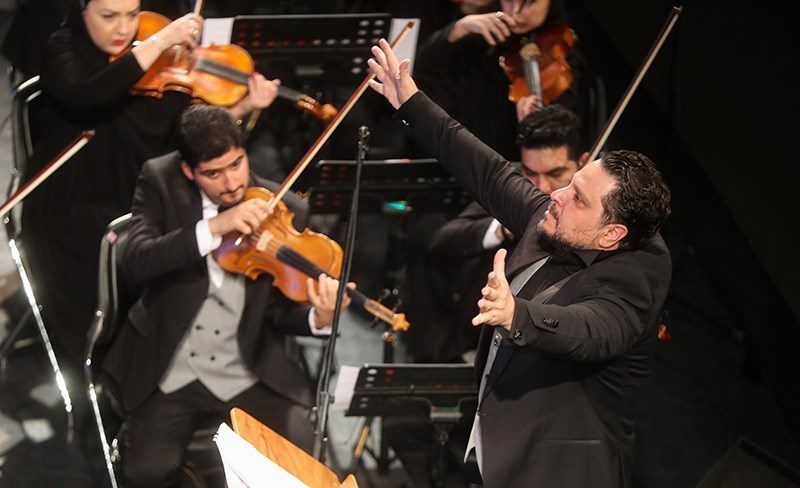
In a night steeped in nostalgia and national pride, the IRIB Symphony Orchestra took the stage at the 39th Fajr Music Festival on February 14, delivering a moving performance of timeless Iranian compositions that paid tribute to some of the country’s most revered musical masters and left the audience immersed in a rich tapestry of symphonic and traditional sounds.
On the evening of February 14, 2024, the 39th Fajr Music Festival hosted the IRIB Symphony Orchestra for its third night, presenting a concert of iconic and enduring pieces from the canon of Iranian music. Conducted by Hossein Sharifi and Hassan Akbarian, with the choir led by Serjik Mirzaiyan, the orchestra performed eleven memorable works by masters such as Hossein Dehlavi, Heshmat Sanjari, Loris Tjeknavorian, and Morteza Hannaneh, as well as selections from the Iranian Tableaux Suite.
From the outset, audience members might have expected—according to the usual conventions of symphonic concerts—a brochure or program sheet listing the repertoire and orchestra members, but unfortunately, none was provided.
Despite this, the concert hall was nearly full, indicating a warm reception by music lovers. The first half of the program included Niyayesh-e Yazdan (Prayer to Yazdan), Do Halat (Two States), and Raghs-e Dayereh (Circle Dance). In the second half, the addition of piano, tar, oud, and santur players enriched the orchestra’s timbre as they performed the nostalgic overture Hezardastan, which was met with great enthusiasm.
The performance continued with Be Zendan (To Prison), featuring a violin solo by Hassan Akbariyan accompanied by the orchestra, followed by Sabok-Bal (Light-Winged), Naghmeh-ye Turk (Turkish Melody), and Iran. The evening concluded with the beloved piece Khusheh Chin (The Gleaner) by the late Rouhollah Khaleghi. Before the final piece, conductor Hossein Sharifi dedicated the performance to his mother in memory of his father, asking the audience to stand and applaud their own parents.
Khusheh Chin was sung by Mahyar Mehrazar (orchestra director), although this vocal performance was arguably the weakest part of the evening, lacking in technical precision. That said, the overall sound of the IRIB Symphony Orchestra was commendable, though moments of inconsistency between different sections of the ensemble were occasionally noticeable. With further rehearsals and more precise conducting, these issues could be corrected.
As for the traditional Iranian instruments featured in some pieces, they were sometimes rhythmically out of sync with the rest of the orchestra. Nevertheless, the performance was strong enough to merit a passing grade. The orchestra succeeded in delivering a memorable night filled with nostalgic Iranian music for its audience.
Written By Farid Parish
